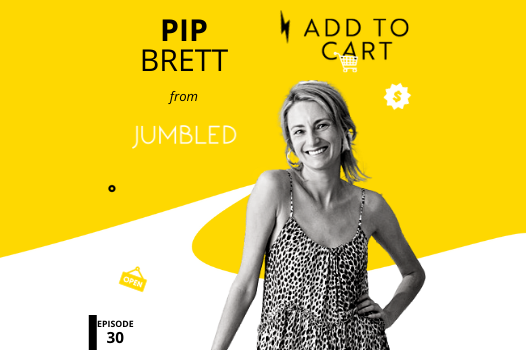In this episode of Add To Cart, we are joined by Pip Brett, owner of JUMBLED, an award-winning homewares and fashion retailer. Based out of Orange in regional NSW, Pip and her team have created a product range which would be better described as a gallery and a customer base that would be better described as a community.
This chat covers everything from how regional retailers often make better storytellers, how JUMBLED approach the complicated world of shipping with regional, bulky and fragile complications and how Pip and the team are collaborating with the best in design to create a unique product for JUMBLED.
“We’re all about joy and colour and what makes us happy, which then makes other people happy“
Pip Brett
Questions answered in this episode include…
- What are the positives and negatives of running a retail business regionally?
- How do you grow and manage your significant Instagram following of 125k?
- What is in the future for JUMBLED?
The beginning of Pip Brett’s business
Pip grew up in Orange, New South Wales where her mother ran a clothing store for 25 years. She shares that having a clothing store in a small town was quite groundbreaking back then, since there were rarely any beautiful shops that sell different kinds of clothes. She went to boarding school, then went to study fashion at UTS. Initially, Pip wanted to be a designer, however, in her fourth year, she decided against it after realising that she wanted to be a retailer.
She later decided to establish her own store. Although she considered Sydney as a location, she ultimately chose Orange, because big brands only had stores in major cities. There were only a few beautiful stores in small country towns. She also mentioned that there are so many young people in these areas who would be happy to have easier access to such products. So, she established her clothing store, Iglou, in her hometown.
She later opened a homeware store called Jumbled after buying a new house and realising her love of homewares is almost as great as her love of fashion. Pip says that the homewares store is so unique and different that the business has grown quite quickly and they have outgrown their space sooner than they expected.
They started looking for a new location and her husband found that the old Masonic Lodge in Orange was up for sale. They bought and renovated the place in six weeks to achieve the dream look that she had for her concept store.
Pip’s clothing and fashion used to have separate stores, but due to the health crisis, she decided to combine the two in one store. For Pip, fashion is all about that magical power that people feel when they wear something new and feel so good while wearing it. “That’s what I want people to feel when they wear something from our store. When you look good, you feel good and vice versa.” The homewares side of the store is all about pieces that have a story that people can connect with, that they love in particular. She says that it’s probably the reason why the store has been growing quickly.
Pros and cons of running a regional retail business.
On the positive, Pip says that there is no better time to be a regional store. She feels that the global health crisis has given regional retailers a chance to get their products out there and thrive.
The negative part is that it’s hard to find brands willing to partner with regional retailers. When she established her first retail store, it was very hard to try and get brands on board because nobody knew about the business. There is also a misconception that because they are located in small towns, the people residing in the area may not like ‘cool things’. Pip disagrees with this, adding that the people in these towns have as much style, as much money (if not more), as those who live in major cities.
The challenges in logistics
Pip says that when it comes to logistics, it has always been a constant battle for them. A lot of customers expect free shipping from retailers, which is hard to offer, especially for regional retailers. Unlike stores in Europe or the US, logistics can be tricky in Australia since the country is big and shipping goods from one state to another is costly.
She says it is important to have someone on the team who is really invested in the business, who knows the best ways to send each item to the customers. There are various ways to send out the items, depending on what it is and where it’s going. The business needs someone who possesses critical thinking and problem-solving skills to determine if they should use post, couriers, pack-and-send, removalists, etc.
Providing exceptional in-store and online experiences for customers
Pip and her team have tried providing their customers with an in-store level of service using their social media accounts. They helped their customers by offering advice, creating videos, and showing people their products online.
When it comes to their online store, they still try to give it a feel of the actual physical store using great visuals. They use the same language they use in-store for their product descriptions, blogs, and newsletters. Even the shipping confirmation emails sent to their customers are personalised.
According to Pip, every online order goes out with a personalised note based on who the customer is, what they ordered, and how well they know the customer. She feels that every online order is a mini miracle since there are so many steps that people have to go through to buy from someone they don’t know. Hence, they have been making real efforts in making the notes more thoughtful and grateful.




